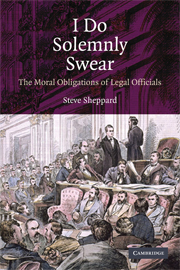Book contents
- Frontmatter
- Contents
- Preface: Moral Officials, Retail Justice, and Three Caveats
- Acknowledgments
- Introduction: Seven Questions about What Is Fit for an Official to Do
- 1 Law and Office
- 2 The Stakes: The Interests of Others in Official Actions
- 3 Officials' Obligations Arise from More Than the Law Alone
- 4 The Moral Obligations of Legal Officials
- 5 Patterns of Relationship between Legal and Moral Obligations
- 6 Breaching Obligations
- 7 Tools for the Trade: Maxims and Fallacies
- Epilogue: What the Official Ought to Do: Law and Justice
- Appendix: Taxonomy of Headings: The Lawes and Libertyes of Massachusetts (Discussed in Chapter 1)
- Index
- References
3 - Officials' Obligations Arise from More Than the Law Alone
Published online by Cambridge University Press: 05 June 2012
- Frontmatter
- Contents
- Preface: Moral Officials, Retail Justice, and Three Caveats
- Acknowledgments
- Introduction: Seven Questions about What Is Fit for an Official to Do
- 1 Law and Office
- 2 The Stakes: The Interests of Others in Official Actions
- 3 Officials' Obligations Arise from More Than the Law Alone
- 4 The Moral Obligations of Legal Officials
- 5 Patterns of Relationship between Legal and Moral Obligations
- 6 Breaching Obligations
- 7 Tools for the Trade: Maxims and Fallacies
- Epilogue: What the Official Ought to Do: Law and Justice
- Appendix: Taxonomy of Headings: The Lawes and Libertyes of Massachusetts (Discussed in Chapter 1)
- Index
- References
Summary
For no phase of life, whether public or private, whether in business or in the home, whether one is working on what concerns oneself alone or dealing with another, can be without its moral duty; on the discharge of such duties depends all that is morally right, and on their neglect all that is morally wrong in life.
Cicero, On Duties, Book 1, Chapter 2Having considered one view of what officials are, one in which the discretion to act is within a complex array of boundaries, we then considered some of the pervasive effects of officials' actions in the lives of others. The question now is whether there are meaningful arguments that the officials must exercise their discretion with such effects according to anything more than law or personal whimsy. This chapter examines that question and finds several independent sources of obligation binding officials that arise beyond the specific rules of law and the personal whims of the individual.
First, the very nature of the law demands that the individual act from a moral foundation beyond the law itself. This demand is explicit in the requirements and forms of oaths that are essential for any official to accept the powers of office, and it is inherent in the structure of the legal system itself. Second, there is no meaningful basis for believing, really, that officials are not supposed to be right or good, or that they are somehow exempt from the general obligations of moral behavior in society.
- Type
- Chapter
- Information
- I Do Solemnly SwearThe Moral Obligations of Legal Officials, pp. 102 - 123Publisher: Cambridge University PressPrint publication year: 2009



